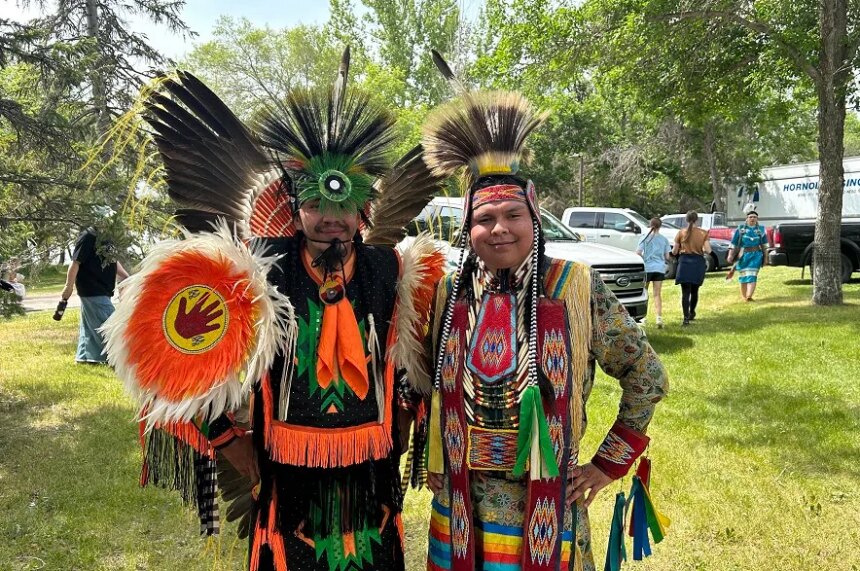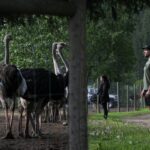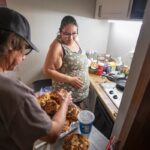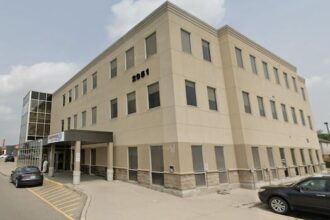The morning sky broke clear over Saskatoon’s Victoria Park as hundreds gathered Thursday for the annual Rock Your Roots Walk for Reconciliation, creating a vibrant tapestry of orange shirts moving in solidarity through the downtown core. The event, now in its ninth year, has evolved into one of Saskatchewan’s most significant public demonstrations of commitment to Indigenous-settler reconciliation.
“This isn’t just a walk—it’s a living promise,” said Elder Mary Whitestone, who opened the ceremony with a traditional blessing. “Each footstep we take together represents our commitment to healing historical wounds and building meaningful relationships based on mutual respect.”
The 2025 event drew an estimated 1,200 participants from diverse backgrounds—students, professionals, families, and dignitaries—many wearing orange shirts symbolizing the legacy of residential schools. The walk began at Victoria Park and wound through downtown Saskatoon, accompanied by traditional drumming that echoed between office buildings.
Mayor Claire Thompson, who participated alongside city councillors and provincial representatives, emphasized the municipal government’s ongoing commitment to the Truth and Reconciliation Commission’s calls to action.
“Reconciliation isn’t a single event but a continuous journey that requires sustained effort from every level of government and every citizen,” Thompson told CO24 News. “Today’s powerful turnout demonstrates that Saskatoon residents understand this responsibility.”
This year’s walk featured an expanded cultural celebration component, with Indigenous artisans displaying traditional crafts and contemporary works at booths along the route. Performance spaces showcased traditional dance, storytelling, and music—creating impromptu teaching moments about Indigenous cultures for many attendees.
Jason Running Wolf, coordinator with Saskatoon Tribal Council and one of the event organizers, noted the walk’s growth since its inception.
“When we started in 2016, we had maybe 400 people. Today, we’re three times that size, and more importantly, we’re seeing deeper understanding,” Running Wolf explained. “People aren’t just walking—they’re engaging with Indigenous knowledge keepers, asking questions, and forming relationships that continue beyond this single day.”
Educational components featured prominently throughout the event. Participants received information about the history of residential schools, the Sixties Scoop, and ongoing systemic challenges facing Indigenous communities across Canada.
School participation was particularly strong this year, with over 20 schools bringing students to participate. Jennifer Mackenzie, a Grade 8 teacher at Riverside Middle School, brought her class of 28 students.
“These students represent our future,” Mackenzie said. “By engaging them directly in reconciliation efforts now, we’re cultivating a generation that understands both the historical context and their personal responsibility moving forward.”
The Rock Your Roots Walk is organized by Reconciliation Saskatoon, a community initiative comprising over 100 organizations, non-profits, businesses, and faith communities working together to encourage action on the Truth and Reconciliation Commission’s calls to action.
Sarah Henderson, executive director of Reconciliation Saskatoon, emphasized that while the walk itself is meaningful, the organization’s work continues year-round.
“The walk is our most visible event, but reconciliation requires sustained effort,” Henderson said. “We’re developing educational resources, facilitating dialogue between Indigenous and non-Indigenous communities, and advocating for systemic changes at institutional levels.”
According to a recent survey conducted by the University of Saskatchewan, public awareness of reconciliation issues has increased 37% in the province since 2018, a trend organizers attribute partly to events like Rock Your Roots.
As the walk concluded with a community feast featuring both traditional Indigenous foods and contemporary offerings, conversations between strangers had transformed into exchanges between newfound connections.
“The food brings us together, but it’s the stories shared over meals that truly build understanding,” said Dakota chef Robert Clearwater, who coordinated the feast.
As Saskatoon continues its reconciliation journey, events like Rock Your Roots serve as powerful reminders of both historical injustices and the potential for healing through collective action. The question facing participants as they departed was not whether reconciliation matters, but how each person will continue this essential work in their daily lives beyond the symbolism of a single day’s walk.










